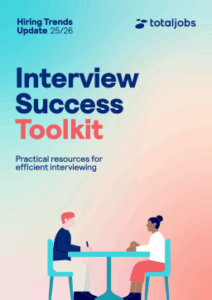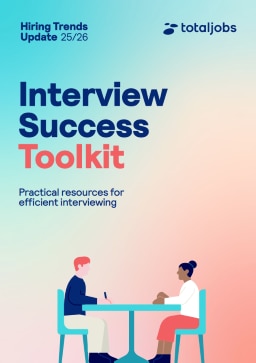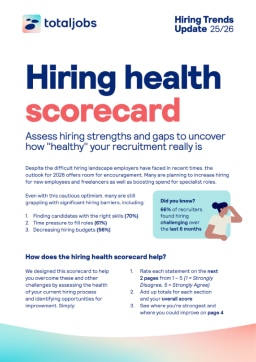
How to conduct an interview
Table of Contents
- The purpose of job interviews
- Different types of job interview
- Preparing for an interview
- How to conduct an interview
- Take interviews to the next level
- Effective interviews and feedback
- FAQs

Interview Success Toolkit
Hiring the right candidates is crucial for employers to secure the skills and expertise they need. A key part of this process is conducting thorough job interviews that make it possible to identify an outstanding candidate for a specific role.
In this article, we look at the importance of interviews, how to prepare for them, and how to conduct an interview process that helps identify the talent you need.
Key takeaways
- Interviews allow employers to assess a qualifications, experience and skills.
- 94% of employers use skills assessments in hiring.
- 27% of candidates prefer fully remote/video interviews.
- 86% of candidates are less likely to accept an offer after a poor hiring process, making structured communication and professionalism vital.
- Review CVs and job requirements to prepare a mix of open-ended and competency-linked questions.
- Use the STAR method (Situation, Task, Action, Result) when asking follow-up questions to clarify candidate responses.
What is the purpose of a job interview?
Interviews are an opportunity to gain a better appreciation of an applicant’s skills and experience. Using various interview techniques and formats, talent professionals can understand if a candidate:
- Has qualifications that make them well suited to the role
- Has experience that will help them transition into the role
- Possess relevant transferable skills
In addition to assessing their suitability, interviews can be used to explain to the candidate more about your company’s culture and values.
By discussing the working environment and role expectations throughout the interview process, and giving candidates a chance to ask questions, you can also establish trust, enhance your employer branding, and even reduce time to hire.
Different types of job interview
There are several interview formats to choose from. So, at the outset of the hiring process, you need to determine which one will help you secure the right candidates.
Competency-based interviews
A competency-based interview is designed to gauge whether candidates have the skills required to succeed in the role. With 94% of businesses implementing skills assessments in their hiring processes, competency-based interviews look set to become increasingly important for employers.
Using competency-based interview questions, you can explore the candidate’s knowledge and experience and unlock a range of benefits, including:
- Enhanced objectivity
- Reduced bias
- Better retention
- Improved employer branding

Reading tip
Video interviews
With remote and hybrid working now established norms, video interviewing has become increasingly popular.
In fact, our research shows that over a quarter of candidates prefer fully virtual/remote interviews. As a result, conducting interviews in this way can lead to an increase in job applications.
27%
of candidates prefer remote interviews
This format allows recruiters to conduct interviews from the comfort of their own homes and screen candidates before inviting them to a face-to-face meeting.
Panel interviews
Panel interviews allow recruiters to gain a broader perspective of a candidate’s suitability for a role.
While traditional interviews allow for intimate discussions, they can be time-consuming. Panel interviews save time and offer objectivity by reducing personal interaction and allowing multiple stakeholders to question a candidate.
Preparing for an interview
Being unprepared for interviews can result in costly mistakes, like hiring someone unsuited to a role or missing out on an ideal candidate.
A well-organised interview can give you a fuller picture of a candidate’s capabilities, reduce bias and create a more positive candidate experience. For example, before the interview begins, you should be clear about who will be asking the questions and if someone else will be present to take notes and ask candidates for more clarity.
Let’s look at some additional steps you can take to prepare for an effective interview.
Understand the requirements of the role
Having a comprehensive understanding of the role you’re recruiting for is essential. That means being aware of the responsibilities of the position and what you’re looking for in a candidate.
A thorough review of the job advert and job description can help determine the key competencies and skills you want from a successful candidate and drive a smooth and efficient interview.
Review applications and CVs
Interviews are an opportunity to learn things about a candidate you don’t already know, not to ask them to repeat information they’ve provided in their application, CV or cover letter.
As a result, you should review the candidate’s CV and any other information they have provided and identify areas you feel need clarification.
Consider your interview questions
Before the interview begins, sketch out the questions you want to ask. This can involve crafting a mix of close-ended and open-ended questions to pose to candidates to ensure you can obtain a full picture of their skills and experience.
If you’re taking a competency-based interview approach, you can use key competencies to build out a targeted list of questions.
How to conduct an interview smoothly and effectively
Once the preparation is complete, the next stage is conducting the interview itself. Whilst no two interviews are the same, there are steps you can take to ensure a smooth process and a positive candidate experience. Let’s take a closer look.
1. Prepare the interview environment
Whether it’s an in-person or virtual interview, the setting plays a crucial role.
For face-to-face interviews, book a quiet, comfortable meeting room in advance. For virtual interviews, ensure a distraction-free space with a reliable interview connection.
Test any equipment beforehand, such as cameras, microphones, or software platforms to avoid disruptions caused by technical issues.
2. Build rapport with the candidate
Starting the interview on a positive note will help the candidate relax and lead to a more productive conversation. You can build rapport quickly by:
- Greeting the candidate warmly
- Making eye contact and smiling
- Engaging in light small talk to break the ice
If you’re interviewing as part of a panel, introduce each member and explore their roles (for example, one per leads the questions and another takes notes), as this transparency can also help put candidates at ease.

Top tip: Spend the first two to three minutes focusing on connection, not evaluation. A friendly chat about the weather, the office, or a shared interest can help the candidate relax and open up more naturally during the interview.
3. Provide context about the company and the role
Give each candidate a clear understanding of your organisation and the specific role they’re applying for. This ensures they have the necessary context for the interview.
Be sure to:
- Share your mission and values
- Briefly explain the organisation’s goals
- Outline responsibilities and expectations of the role

Top tip: Tailor your overview to the candidate’s background. Highlight aspects of your organisation that align with their experience or interests. this shows genuine engagement and makes your pitch more memorable.
4. Discuss the candidate’s career ambitions
Understanding a candidate’s long-term aspirations provides insight into their motivations and future potential. So, ask about their career ambitions to assess whether their goals align with the growth opportunities you can offer.
This step is crucial in determining the candidate’s cultural fit and long-term value to the organisation.
5. Ask questions specific to core competencies
General questions are useful during an interview, but role-specific ones will give you a much deeper insight into the candidate’s level of expertise. Focus on:
- Core skills required for the position
- Experience related to tasks they’ll be handling
- Situation questions that reveal how they’ve applied their skills in the past
This is where preparation pays off, but try and remain flexible and ready to probe deeper into areas of interest.

Top tip: Prepare a structured question bank before the interview that maps directly to key role competencies. This ensures consistency across interviews and helps reduce unconscious bias in your evaluations.
6. Get clarity with follow-up questions
If the candidate’s answers are unclear or lack sufficient detail, don’t hesitate to ask them additional follow-up questions. These help ensure you get a full picture of their knowledge, skills and experience.
This can include questions like:
- “Can you give me more details about how you handled that project?”
- “What were the specific results of your actions?”
- “Can you walk me through how you approached that challenge?”

Top tip: Use the “STAR” method (Situation, Task, Action, Result) when asking for elaboration. This helps candidates structure their answers and makes it easier for you to assess their real impact and problem-solving approach.
7. Invite questions
Before ending any interview, always give the candidate a chance to ask their own questions. This can not only help them understand the role better, but also demonstrates to you their level of interest.
Look out for questions that highlight their enthusiasm for role, including:
- “What does success in this role look like?”
- “Can you describe the company culture?”
- “What are the next steps in the hiring process?”
Be prepared to answer the candidate’s questions honestly, as this helps them evaluate whether the role is a good fit for them, benefiting both parties in the long term.
8. Outline the next stage
Wrap up the interview by outlining the next steps in the recruitment process. This is your opportunity to ensure that the candidate knows:
- Whether there will be a second interview or task
- When they can expect to hear back from you
- Any other steps involved in the hiring process
80%
of candidates want to be notified within a week of interviewing
Being clear about the timeline and process provides a sense of closure for the candidate while also demonstrating that your organisation respects their time and effort.
Remember, 86% of candidates are less likely to accept an offer from a company with a poor hiring process, so managing expectations and clearly communicating next steps is vital.
9. Evaluate candidate performance
After the interview is complete, take some time to evaluate the candidate’s performance. Remember to use an objective scoring system that takes into account their skills, cultural fit, and how well they align with your organisation’s values.
This step helps to ensure that you make a well-informed decision as you move forward, making it more likely you make an offer to a candidate well-suited to the role.

Top tip: Complete your evaluation form immediately after each interview, while impressions are still fresh. Document specific examples or quotes to support your scores, as this helps maintain fairness and accuracy during final deliberations.
Take your interviews to the next level

Reading tip

Reading tip
The importance of effective interviews and feedback
Effective interviews enable your organisation to identify and onboard the talent you need to achieve your strategic goals and objectives. But the process shouldn’t end there.
Providing comprehensive feedback, whether a candidate has been successful or not, reflects well on you as an employer, leaving a lasting impression on candidates that can support future talent acquisition.
Frequently asked questions (FAQs)
What are the key steps in conducting an interview?
To conduct an interview effectively, start by preparing the environment, reviewing the candidate’s CV, and planning your questions in advance. Build rapport early, ask competency-based questions, and close by explaining the next steps in your hiring process.
How can I make candidates feel comfortable during an interview?
Create a welcoming atmosphere by greeting the candidate warmly, introducing yourself and any panel members, and starting with light conversation. A relaxed candidate is more likely to offer authentic and thoughtful answers.
How can I assess a candidate’s skills during an interview?
Use structured assessment methods like scenario questions, work samples, or skills tests. Combine these with consistent scoring criteria to ensure fairness and identify candidates with the strongest alignment to your role requirements.
How do I evaluate candidates after an interview?
Immediately after each interview, complete a scoring sheet that rates candidates against predefined competencies. Note key examples from their responses and compare evaluations with other interviewers to maintain objectivity.
Why is it important to conduct structured interviews?
Structured interviews use the same set of questions and scoring criteria for every candidate, which helps reduce bias and improve decision-making. This approach leads to fairer hiring outcomes and stronger candidate-job matches.
Explore articles
Receive the latest recruitment resources and
advice to boost your hiring
By providing us with your details you agree to our privacy policy and for us to keep you updated with the latest news, events,
and special offers from Totaljobs.









